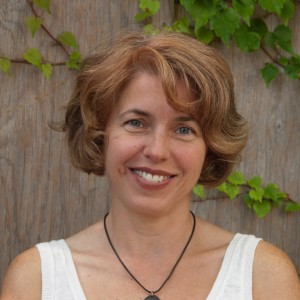Interview conducted by Jennifer D. Foster
A career as an editor is often a solo adventure, especially if you’re a freelancer. So we thought one way to better connect with fellow editors was to ask them the W5: who, what, where, when, and why. Read on for some thought-provoking, enlightening tidbits from those of us who choose to work with words to earn our keep.
Catherine, please tell us a little about yourself, the kind of work you do, and how long you’ve been an editor.
I’ve been working as a freelance editor for 10 years after working in-house as a production editor at Penguin. I love the freedom and flexibility of freelancing and the amazing variety of projects I do. I work on trade books—all kinds—but with a special passion for children’s books. When I’m not editing, I’m often out hauling water to thirsty trees, biking, or sitting on my porch enjoying a coffee and a book.
Who: If you could edit one famous author, living or dead, who would it be?
Being an editor may be solitary, but I don’t welcome communing with ghosts! However, if I were to be haunted by a dead author (with manuscript in hand), I’d pick a Brontë, preferably Charlotte. I think we are kindred spirits.
Closer to home and the present, I’ve been a huge admirer of Deborah Ellis ever since my son and I “tandem” read The Breadwinner series last summer. She is an activist, and her books are a great catalyst for change among kids who can see themselves in the “ordinariness” of her characters as they prevail in the most difficult circumstances. From war-torn Afghanistan to the coca fields of Bolivia and beyond, she tackles big issues––drug trafficking, homelessness, child labour, leprosy, HIV––but somehow leaves the reader feeling renewed and hopeful. Kids are capable of so much empathy, and she really taps into that gift. It would be a pleasure and an honour to work on one of her books.
What: What is your favourite punctuation mark and/or a favourite word?
It’s a toss-up between the semicolon and the em dash. I love them both for very different reasons. I may have been over-proud of mastering the use of the semicolon early on because my university essays are absolutely littered with them. (I could have used an editor.) The semicolon is an exacting piece of punctuation, with rigid rules and limited usage, but it is the most beautiful of punctuation marks when used correctly.
Although there are rules around using em dashes, they feel more free-spirited and forgiving. They’re also full of drama and put to good use in personal letters, journals, and poetry. And they come in pairs, which appeals to my desire for symmetry.
Favourite word? Today, I’d have to say marmalade.
Where: If you could work anywhere in the world as an editor, where would that be?
I like where I’m at right now, on my back deck on a sunny summer morning. Listening to the breeze helps me focus. But since editors are advised to take frequent breaks, I’d love to live and work in great walkable city like Rome. Imagine a short break to explore the Pantheon (you can do it bit-by-bit!), or pick up fresh flowers at an outdoor market, or admire the fountains in the Piazza Navona. A few years back, I read Tom Rachman’s The Imperfectionists, about a struggling ex-pat newspaper reporter living in Rome, and I was captivated. Then I visited and was blown away by the rich history and art within tripping distance everywhere I stepped.
Failing that, I think I’d be well-suited to a secluded cabin in the woods.
Why: Why did you choose to become an editor? Or, should we ask, why did editing choose you?
Well, I love to do many things, but I have no regrets about being an editor. The closest I came to questioning my career choice was during the early days of freelancing when my son was young and needed lots of care, and my main client was an academic publisher whose books were fairly impenetrable. There may have been a few middle-of-the-night crying jags in those days. Now I have a nice mix of clients and lots of variety. I work on adult fiction and non-fiction, as well as children’s books, including fiction, biography, craft and activity books, picture books, and graphic novels. I’m happy.
Growing up, I was voracious reader and loved writing stories. I corrected essays, crafted speeches, and edited newsletters for friends and family long before I was paid to do it. I worked as a bookseller for years, which felt like home to me but hardly paid the bills, and when the independent stores began to falter, I enrolled in Ryerson’s publishing program. I haven’t looked back since.
And, of course, we just had to ask the inevitable how: How would you sum up your motto?
Don’t give the manuscript an Edward Scissorhands, no matter how much you think you can improve it.
Jennifer D. Foster is a Toronto-based freelance editor and writer, specializing in book and custom publishing, magazines, and marketing and communications.
This article was copy edited by Chris Hughes.
